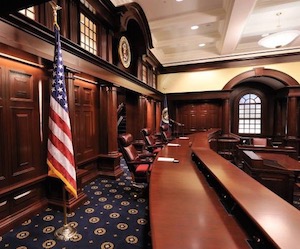CAFC says same panel can decide institution and merits in IPR
 Last month, the United States Court of Appeals for the Federal Circuit issued a decision in Ethicon Endo-Surgery, Inv. V. Covidien LP, an appeal from the United States Patent and Trademark Office (USPTO), Patent Trial and Appeal Board (PTAB). The dispute arose as the result of a Covidien inter partes review (IPR) petition challenging claims of U.S. Patent No. 8,317,070 (“the ’070 patent”), which is owned by Ethicon. The PTAB granted the petition and the IPR proceeded to a decision on the merits. On the merits, the same panel that determined that the petition should proceed in the first place, found all challenged claims invalid as obvious over the prior art.
Last month, the United States Court of Appeals for the Federal Circuit issued a decision in Ethicon Endo-Surgery, Inv. V. Covidien LP, an appeal from the United States Patent and Trademark Office (USPTO), Patent Trial and Appeal Board (PTAB). The dispute arose as the result of a Covidien inter partes review (IPR) petition challenging claims of U.S. Patent No. 8,317,070 (“the ’070 patent”), which is owned by Ethicon. The PTAB granted the petition and the IPR proceeded to a decision on the merits. On the merits, the same panel that determined that the petition should proceed in the first place, found all challenged claims invalid as obvious over the prior art.
Ethicon appealed to the Federal Circuit, arguing that the PTAB’s final decision was invalid because the same Board panel made both the decision to institute and the final decision. Ethicon also argued that the Board erred in finding the claims obvious.
Supreme Court accepts Inter Partes Review Appeal
 On Friday, January 15, 2016, the United States Supreme Court accepted the petitioner’s request to hear Cuozzo Speed Technologies v. Lee, a case that will now require the Court to address two questions about inter partes review (IPR) proceedings.
On Friday, January 15, 2016, the United States Supreme Court accepted the petitioner’s request to hear Cuozzo Speed Technologies v. Lee, a case that will now require the Court to address two questions about inter partes review (IPR) proceedings.
IPR proceedings were created by the America Invents Act (AIA), which was signed into law by President Barack Obama on September 16, 2011. IPR and the other two forms of post-grant challenge to issued patents — Post Grant Review (PGR) and Covered Business Method (CBM) Review — did not become available as a procedure to challenge patents until September 16, 2012. Thus, these proceedings are quite new and Cuozzo will be the first opportunity for the Supreme Court to weigh in on these controversial administrative proceedings.
According to the statute, “[a] person who is not the owner of a patent may file a petition to institute an inter partes review of the patent.” 35 U.S.C. 311(a). Significantly for this appeal, the statute also says: “The determination by the Director whether to institute an inter partes review under this section shall be final and nonappealable.” 35 U.S.C.314(d). Additionally, although the statute is silent as to the proper claim construction standard to use in post grant proceedings, the United States Patent and Trademark Office (USPTO) has decided to apply the familiar standard used elsewhere throughout the Office, which is the broadest reasonable interpretation (BRI) rather than the so-called “Phillips standard” that is used in district court litigation and narrowly construes claims in an already issued patent. (more…)
02.1.16 | Inter Partes Review, Patent Issues, Supreme Court Cases, USPTO | Gene Quinn
CAFC says PTAB does not have to allow timely submission of supplemental information in IPR
 Several weeks ago, the United States Court of Appeals for the Federal Circuit issued a decision in Redline Detection, LLC v. Star Envirotech, Inc., relating to an inter partes review (IPR) challenge brought by Redline challenging the validity of certain patent claims of U.S. Patent No. 6,526,808 (the “’808 patent”).
Several weeks ago, the United States Court of Appeals for the Federal Circuit issued a decision in Redline Detection, LLC v. Star Envirotech, Inc., relating to an inter partes review (IPR) challenge brought by Redline challenging the validity of certain patent claims of U.S. Patent No. 6,526,808 (the “’808 patent”).
After deciding to institute the IPR, the Patent Trial and Appeal Board (PTAB) found in favor of the patent owner. Redline appealed the decision of the PTAB to the Federal Circuit, arguing that it was improperly denied the opportunity to submit supplemental information under 37 C.F.R. §42.123(a) and that the PTAB erred with respect to finding that claims 9 and 10 of the ‘808 patent were not invalid.
The ‘808 patent, owned by Star Envirotech, relates to methods of generating smoke for use in volatile and explosive environments. More specifically, the ’808 patent describes methods for generating smoke that enables the presence and location of leaks in a fluid system to be accurately and visually detected depending upon rate of the air flow through the fluid system under test and whether smoke escapes from the system. The invention allows for the more accurate testing of whether automobile emissions are leaking into the environment.
01.26.16 | CAFC, Patent Issues, posts, USPTO | Gene Quinn
USPTO seeks comment on post grant initiation pilot program
The United States Patent and Trademark Office (USPTO) has published a request for comments on a proposed pilot program pertaining to the institution and conduct of post grant administrative trials. The America Invents Act (AIA), which was signed into law on September 16, 2011, provides for the following post grant administrative trials: Inter Partes Review (IPR), Post-Grant Review (PGR), and Covered Business Method Review (CBM). These new administrative procedures became available on September 16, 2012, one year after the signing of the AIA.
The USPTO currently has a panel of three Administrative Patent Judges (APJs) determine whether to institute a trial, and then normally has the same panel conduct the trial, if a decision is made to institute a trial. The USPTO is now considering a pilot program where the determination of whether to institute an IPR would be made by a single APJ. If the decision is to institute a proceeding, two additional APJs would be assigned to the IPR, joining the APJ who decided to institute the trial. (more…)
08.25.15 | America Invents Act, Inter Partes Review, Patent Issues, Post Grant Review | Gene Quinn
House Judiciary Nixes CBM Extension
On Thursday, June 11, 2015, the House Judiciary Committee held a hearing for the purpose of marking up “the Innovation Act.”
One of the issues that took up a significant amount of time during the first half of the hearing was an amendment submitted by Congressman Darrell Issa regarding a proposed extension of covered business method (“CBM”) review. Those familiar with the America Invents Act (AIA) will undoubtedly recall that CBM reviews were ushered in as one of the three new post grant proceedings that could be used to challenge issues U.S. patents. The program was conceived to be temporary, and is scheduled to sunset on September 16, 2020. Issa’s amendment would have postponed the termination date of the program until December 31, 2026.
Unlike inter partes review (“IPR”), a petition for a CBM may NOT be filed unless the real party-in-interest or privy has been sued for infringement of the patent or has been charged with infringement under that patent. “Charged with infringement” means “a real and substantial controversy regarding infringement of a covered business method patent such that the petitioner would have standing to bring a declaratory judgment action in Federal court.” 37 CFR 42.302(a). Additionally, unlike with IPR, a CBM proceeding can raise issues surrounding both patent eligibility under 35 U.S.C. 101 and sufficiency of disclosure under 35 U.S.C. 112.
Issa stated during the hearing that, at the time Congress passed the AIA, the idea was to create CBM review for a trial period and the program would be extended if successful. Issa is mistaken. The complete name of the process even has the word “transitional” in the title. The entire purpose of CBM review was to allow for challenges to certain financial business method patents in a post grant proceeding that could raise patent eligibility and sufficiency of disclosure. Those issues are off the table in IPR. They can be raised in Post Grant Review (PGR), but PGR is only available to challenge patents that were examined under the first-to-file provisions of the AIA. Thus, Congress wanted to allow for a form of PGR for financial business method patents granted under pre-AIA first-to-invent rules. Thus, there is a time limit to the useful period of this special variety of post grant review.
“We should be ending [CBM] rather than extending it,” Congressman John Conyers (D-MI) stated in response.
Congressman Collins (R-GA) also explained that he cannot support extending CBM, saying that “a property right should be a property right.” Collins also expressed confusion regarding why this matter is pressing at the moment, saying: “I am confused as to why we are considering the extension of a program that is scheduled to sunset in 2020. Why are we debating this here today… do we really know how CBM will affect our economy… we should be having this debate in 2020.” Ultimately, Collins urged his colleagues to oppose this “premature amendment.”
Congresswoman Suzan DelBene (D-WA) echoed the comments of Collins, but also took issue with earlier comments of those in support of the amendment who said that there was no evidence that CBM has been inappropriately expanded beyond financial services patents. DelBene pointed out that there have, indeed, been instances where the Patent Trial and Appeal Board (PTAB) has been accused of expansively interpreting its own jurisdiction beyond what Congress envisioned when the AIA was passed.
The amendment to extend CBM was defeated by a vote of 18-13. At least for now, it is not in the House bill. If and when the bill gets considered on the floor of the House, extension of CBM could resurface in one way or another.
06.26.15 | Patent Issues, Patent Reform | Gene Quinn



No Comments
02.22.16 | Federal Circuit Cases, Inter Partes Review, Patent Issues, posts | Gene Quinn